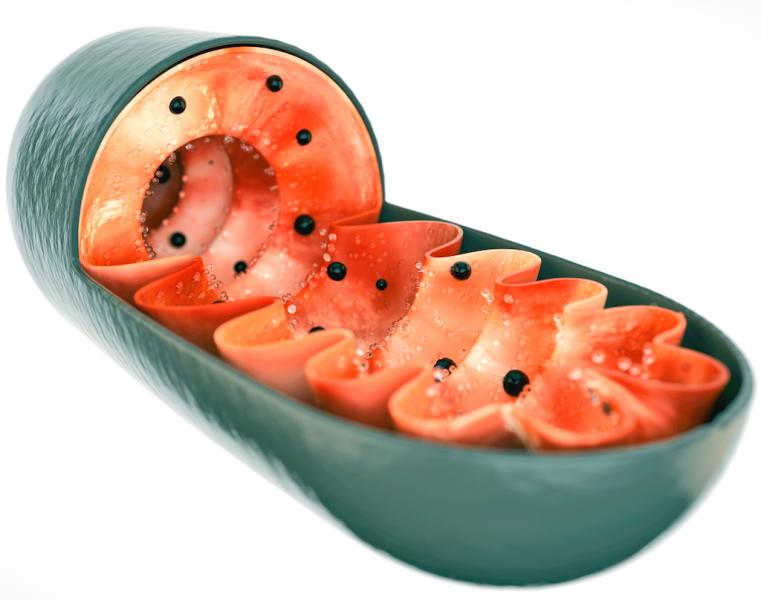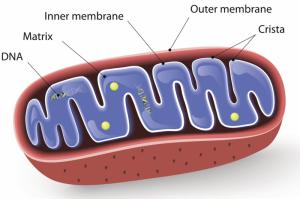
 Inside of the cells of every plant, animal and human being you will find small structures called mitochondria. These rod-shaped organelles (cellular organs) are the power plants for cells. Their job is to convert the calories from carbohydrates, fats and proteins into energy the cells can use. They provide every cellular process with the energy it needs to function using a cyclic process known as the Krebs cycle.
Inside of the cells of every plant, animal and human being you will find small structures called mitochondria. These rod-shaped organelles (cellular organs) are the power plants for cells. Their job is to convert the calories from carbohydrates, fats and proteins into energy the cells can use. They provide every cellular process with the energy it needs to function using a cyclic process known as the Krebs cycle.
Researchers are now discovering that mitochondria do more than produce energy. They also play a role in the synthesis of fatty acids, the regulation of cellular levels of amino acids and enzyme cofactors, balancing levels of heme (the iron compound that forms the basis of hemoglobin), calcium balance, neurotransmitter synthesis and insulin secretion.
Mitochondria also produce reactive oxygen species (free radicals) that can damage their own structures as well as other structures in the cell if there aren’t enough antioxidants present to regulate them. They also play a role in apoptosis, which is the mechanism that triggers cells to die. Apoptosis is the process by which the body gets rid of virally infected cells and cancer cells. Without apoptosis multicellular organisms can’t protect themselves from cells that have started to malfunction.
Mitochondrial Dysfunction as a Root Cause of Disease
As all this research is coming forth, science is discovering that mitochondrial dysfunction is involved in numerous degenerative diseases. First, since mitochondria produce energy, anyone who has serious, long lasting fatigue probably has mitochondrial dysfunction. Mitochondrial problems are also involved in diabetes, deafness and neuropathy. It’s also being proposed that health conditions such as cancer, diabetes, fibromyalgia and serious mental illnesses (such as schizophrenia and bipolar disease) may result from mitochondrial dysfunction, although the research on the role mitochondria play in all these diseases isn’t clear yet.
An article in Integrative Medicine in August of 2014 suggested that mitochondrial dysfunction may be occurring in “... neurodegenerative diseases, such as Alzheimer’s disease, Parkinson’s disease, Huntington’s disease, amyotrophic lateral sclerosis, and Friedreich’s ataxia; cardiovascular diseases, such as atherosclerosis and other heart and vascular conditions; diabetes and metabolic syndrome; autoimmune diseases, such as multiple sclerosis, systemic lupus erythematosus, and type 1 diabetes; neurobehavioral and psychiatric diseases, such as autism spectrum disorders, schizophrenia, and bipolar and mood disorders; gastrointestinal disorders; fatiguing illnesses, such as chronic fatigue syndrome and Gulf War illnesses; musculoskeletal diseases, such as fibromyalgia and skeletal muscle hypertrophy/atrophy; cancer; and chronic infections.” [https://www.ncbi.nlm.nih.gov/pmc/articles/PMC4566449]
That’s quite an impressive list, which is why we’re going to focus on mitochondrial health in this issue of Sunshine Sharing. We’ll provide you with some interesting facts about mitochondria, discuss briefly how mitochondria create the energy and factors that contribute to mitochondrial dysfunction. We’ll also talk about ketogenic diets as well as supplements that may help improve mitochondrial function.
Additional Resources
Sugar Toxic by Margit Silverman
Power, Sex and Suicide: Mitochondria and the Meaning of Life by Nick Lane
Strategies for Health by Steven Horne
Become a Member
Steven Horne's monthly member program is a way for you to get great information about herbs and natural healing to build your herbal business. Including the ability to share issues of Sunshine Sharing like this one. Click here to learn more.


